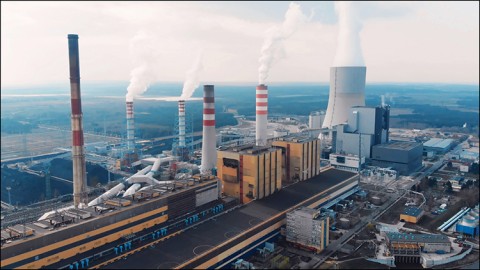The oil and gas sector is grappling with a slew of challenges, ranging from occupational health and safety to financial limitations, as a result of COVID-19 and the ensuing economic crisis. Many of these worries are familiar to industry leaders who have built a living out of risk mitigation. The degree to which leaders can continue to rely on longer-term goals like decarbonization and preparing for the energy transition is being challenged as firms regain their ground following the crisis.
Hala El Manakhly, Risk Management Assessor Expert, has weighed in on the matter, noting that Egypt’s transition is well on its way. El Manakhly stated that “as a researcher and HSE EXPERT, I appreciate the importance of the speed of steps to benefit from the renewable energy sources that Egypt has abundant access to. Egypt’s vision aims to build a competitive, balanced and diversified economy within the framework of sustainable development.”
Additionally, Mohamed Hanafy, Services Director at Triangle Energy, mentioned that, in accordance with the ways in which Egypt has developed in terms of the energy transition, that “Energy transition has been a key topic in the last few years. The government has set a strong plan to increase generation from renewable sources and diversify the energy mix. One key project that will be a main contributor to this target is the Benban PV Solar complex which is considered one of the biggest solar farms in the region and possibly the world.” Hanafy added that, “these actions improve the country’s energy mix, making the consumption less reliant on fossil fuels, reducing emissions and the carbon footprint, in addition to providing a sustainable source of energy. I also see the government’s initiative to convert thousands of public transport vehicles from petrol to natural gas is in alignment with the energy transition strategy, shifting the demand to a more environmentally friendly alternative.”
Although the energy shift will take decades for industrial cycles to complete, several oil and gas firms have already begun to reduce their carbon emissions. For instance, more than 90% of oil and gas participants answered that their firm has or is creating a long-term plan for a sustainable, low-carbon future, as per IRENA’s latest energy transition study.
On the same note, Egypt has facilitated the necessary steps and offered incentives to carry out the energy transition process. Regarding this, El Manakhly noted that “an analytical study was carried out to find out the types of renewable energy and the capabilities that Egypt enjoys and that enables it to maintain the momentum of its economic growth, its sustainability and energy security. And identify the main policy challenges of the market, skills and institutional challenges, and reviews the recommended actions to overcome those challenges.”
Hanafy similarly noted the undeniably significant steps Egypt has taken thus far. Hanafy stated that he “believe[s] the government has taken some serious steps to attract both foreign investments and international partnerships in renewable energy. This is evident from the multiple alliances and agreements signed with major global companies for these projects.”
Of course, with every path to new and innovative energy implementation projects and programs, there is a multitude of advantages and disadvantages. While converting to renewable energy has both advantages and downsides, it is argued that the benefits of using such sources exceed the negatives, especially in the long run. Of course, the flaws are all things that can be remedied with enough time and finances, thanks to Egypt’s recent advancements.
“With the resumption of the growth of global economic activity accompanied by precautionary measures, and the resumption of the pace of work in the various sectors, the renewable energy projects started their gradual growth in a noticeable way, with a noticeable increase in the number of countries. At the local level, the year 2020 witnessed a high demand for investment in renewable energy, whether wind or solar energy projects, in addition to an increase in the energy produced by various types of renewable energy projects,” stated El Manakhly. To summarize the past 36 months, El Manakhly added that, “the only source that maintained its positive performance, albeit low, was renewable energy. Despite all the challenges imposed by the Corona virus, the Egyptian market was able to maintain its attractive position.”
Yet, there are upsides to this unexpected downturn. As a matter of fact, El Manakhly added that, “at the local level, the year 2020 witnessed a high demand for investment in renewable energy, whether wind or solar energy projects, in addition to an increase in the energy produced by various types of renewable energy projects. The only source that maintained its positive performance, albeit low, was renewable energy. Despite all the challenges imposed by the Corona virus, the Egyptian market was able to maintain its attractive position.”
On a similar note, Hanafy was able to sum up the key advantage and disadvantage of the implementation of new and renewable forms of energy in Egypt. Hanafy stated, “the key advantage for the country is the cleaner sources of energy which will reduce emissions and the impact to the environment.” He added that, “the key disadvantage in my opinion is the initial set up costs of the renewable energy projects compared to the conventional ones.”
While the precise timing and direction of the energy transition are unclear, the ultimate goal of low-carbon energy system is no longer a question. Depending on their initial position and goals, each oil and gas firm will evolve its strategies in different ways. It is important that the way forward is well-considered.
With regards to future work, El Manakhly had mentioned the importance of Wastewater Treatment (WWT). “I had the honor to participate as an invited speaker at the First International Conference in Egypt for Membrane Technology and its Applications in Aug 2019, where I discussed my PhD Thesis “Apply Physical Process to Treat and reuse the Industrial Wastewater in Irrigation Purpose. That aimed to remove the Petroleum Pollution from wastewater out of washing activities.” El Manakhly added that “I have several publications discussed the impact of the wastewater treatment. Economic Positive Impact, serve the Environmental Sustainability and serve the Market Requirement; help to manage water resources due to limited water resources and steady population growth. Reduce the high water consumption. That participates in the green and renewable energy system together.”
In conclusion, one of several truths of economic history is that as a new period develops, successful holders can be swept away. The issue for today’s oil and gas organizations is figuring out how to adjust to a low-carbon era, where to invest and how to transform their businesses. Exploring such fundamental concerns highlighted above should help them get back on track.








